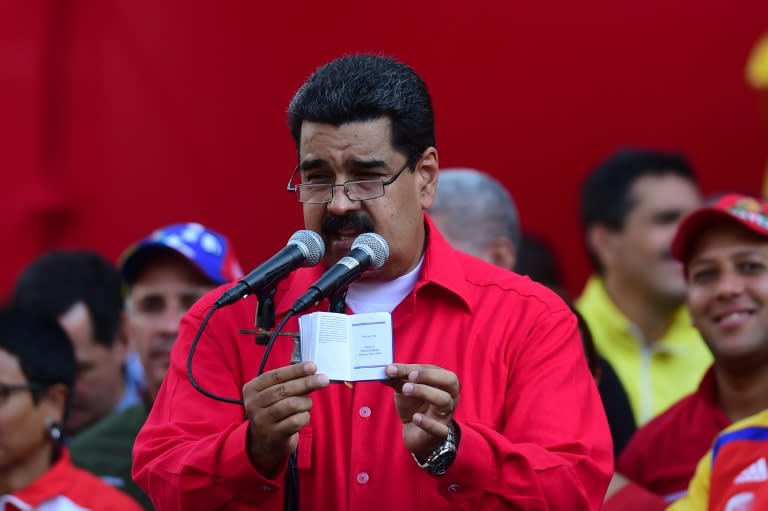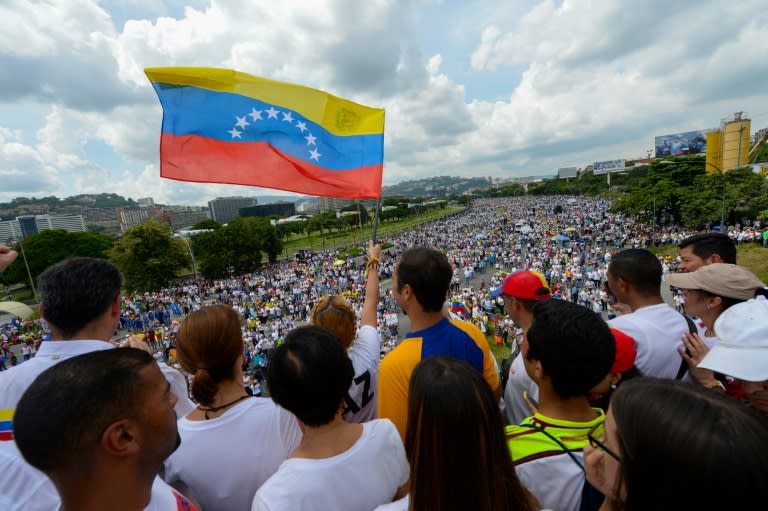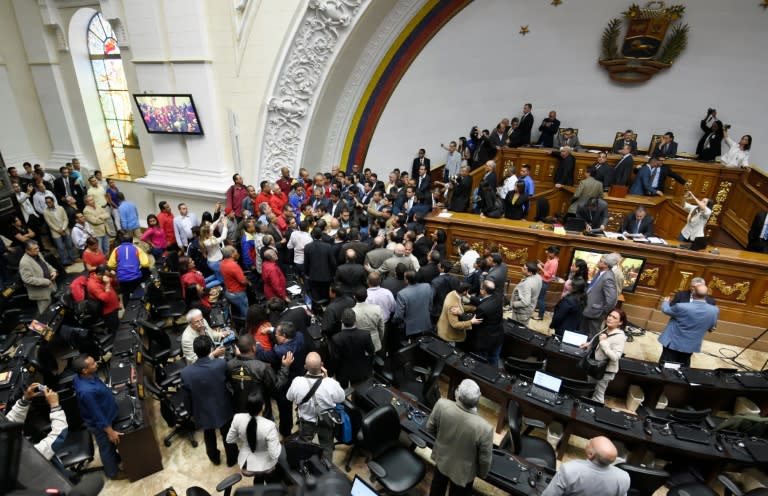Venezuela opposition rallies, Maduro summons ministers
Opponents of Venezuela's leftist President Nicolas Maduro staged mass street rallies Wednesday as he held a crisis security meeting, resisting their efforts to drive him from power. Tens of thousands of opposition supporters began to gather at points around Caracas in the morning and said they planned to march and join up in the east of the capital. "This is a way of pressuring Maduro so he understands that he has to go," said one demonstrator, Klenia Campos, 41. "Being passive is no use anymore. We have to apply more pressure." Pro-government demonstrators also gathered near the Miraflores presidential palace. It is a key test of strength in a power struggle that is destabilizing the volatile South American oil producer. The socialist president and center-right-dominated opposition accuse each other of mounting a "coup." Venezuela is home to the world's largest oil reserves but has plunged into economic crisis due to falling crude prices, leading to shortages of food and medicine. - Political 'theater' - The opposition is furious at the authorities' decision last week to halt their bid for a referendum on removing Maduro from power. "Today we Venezuelans are mobilizing in defense of our constitutional rights and against the coup," leading opposition figure Henrique Capriles said on Twitter. Maduro for his part held a meeting on Wednesday of his National Defense Council. In televised comments at the gathering, he called for "political dialogue and peace in Venezuela." The council comprises top officials including the defense and security ministers, as well as the speaker of the legislature, senior opposition leader Henry Ramos Allup. He said he would not attend. "I will not take part in that piece of theater," he said. "I will not play the part of the fool." - Risk of bloodshed - Analysts have warned of a risk of violent unrest in Venezuela. Clashes at anti-government protests in 2014 left 43 people dead. On Monday, a students group said 27 people were injured in clashes with police at a protest in the western city of San Cristobal. The blocking of the referendum "has brought the political conflict to a critical point," political scientist Luis Salamanca told AFP. "It is vital to avoid the conflict escalating into bloodshed. If dialogue can serve any purpose, it is to avoid that." The head of the armed forces, Vladimir Padrino, who is also Maduro's defense minister, declared "unconditional loyalty" to the president on Tuesday. - President's trial demanded - Maduro calls the economic crisis a capitalist conspiracy. The opposition blames his economic management. A recent poll found that more than 75 percent of Venezuelans disapprove of Maduro. But he has vowed to resist efforts to sack him before his term ends in 2019. Maduro blasted the opposition-majority legislature on Tuesday after lawmakers voted to stage a "political and criminal trial" against him. "We will not permit a parliamentary coup of any kind," he vowed. The assembly summoned Maduro to appear before it on November 1. But it was doubtful that he would turn up. The Supreme Court has overruled the National Assembly's decisions since the opposition majority took control in January. Maduro's opponents say he controls the court and the electoral authorities and has used them to block the referendum. "The MUD has the political capital, but the government has the power," Salamanca said. - Tricky talks - Maduro claims to have the Vatican's backing to hold a "national dialogue" with opponents from next Sunday. The offer appeared to sow divisions in the MUD. The coalition is united mainly by its members' shared hatred of Maduro. The MUD said it would only agree to talks if the government respected the constitutional right to a referendum and freed its imprisoned activists and leaders, among other demands. They insisted any talks be held in Caracas -- not on the Caribbean island of Margarita as Maduro proposes.





